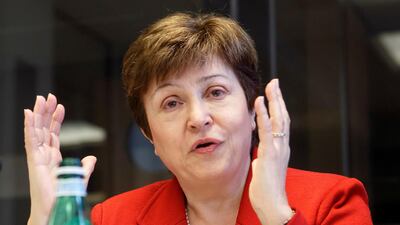The good news is that the International Monetary Fund has confirmed that a qualified and respected multilateralist, Kristalina Georgieva, is likely to succeed Christine Lagarde, the institution’s admired and accomplished managing director since 2011.
Less good is the process that led to this uncontested nomination. As at the World Bank a few months ago, the fact that only a single candidate ultimately emerged reflects exasperation and disappointment with faltering governance reforms in these key institutions. The sentiment risks further undermining their credibility and functioning at a time when policy coordination among systemically important players is weak and the global economy is beset by slowing growth, trade tensions and the risk of a currency war.
In an impressive career spanning four decades, Ms Georgieva, a Bulgarian economist, was directly exposed to policy issues at the regional level, including as the European Union’s international cooperation commissioner, and at the global level while serving at the World Bank, most recently as chief executive officer. She has earned a reputation as a hard worker, listener and manager who gets things done.
All this suggests that Ms Georgieva is well-placed to take the IMF’s reins from Ms Lagarde, who will head the European Central Bank. Yet the process leading to the appointment has been problematic once again.
Similarly to what happened when David R. Malpass, previously a US Treasury under-secretary, was appointed to lead the World Bank in April, Ms Georgieva will face no opposition when considered by the IMF’s executive board despite the well-publicised existence of other highly qualified candidates, particularly from outside Europe. Her confirmation will continue the longstanding tradition by which a European heads the IMF and an American leads the World Bank.
This isn’t a surprise. Prior leadership transitions have made clear that neither institution is committed to reforming a feudal, nationality-based system to pick a new chief decisively on merit. That’s regrettable. Despite private acknowledgement that the practice is outdated and harmful, Europe and the US have continued to jealously guard their historic entitlements to the positions.
When it comes to campaigning, neither even wait for the nomination period to close before pressuring other countries to support their candidates, further narrowing the scope for other contenders to emerge. It hasn’t helped that, this time around, Europe supported lifting an age restriction to enable Ms Georgieva’s selection, though it opposed such a proposal a few years ago when a highly qualified non-European, Stanley Fischer, was an interested candidate.
In such an environment, it makes little sense for other qualified candidates to put their names forward, regardless of the fact that the institutions pay lip service to an “open, merit-based, and transparent process”. That reluctance reflects deep frustration, disillusionment and disengagement.
This is bad news for multilateralism when it’s already under assault from inwardly oriented policies by some countries, a growing disregard for international rules-based approaches and a simmering currency war that could amplify the effects of trade tensions. The actual and potential damage was illustrated this week by the IMF’s own compilation of a new World Trade Uncertainty index covering 143 countries from 1996. What it says is worrisome.
After 20 years of stability, the index has in the past year “jumped 10-fold from the previously recorded highs.” Research shows that such “increases in uncertainty foreshadow significant output declines,” the report says. The IMF’s estimation suggests that “the increase in trade uncertainty observed in the first quarter of 2019 could be enough to reduce global growth by up to 0.75 percentage point in 2019”.
With a weakening global economy and mounting risk of financial market instability, the IMF is under pressure to bolster lending resources. This comes at a time when its largest-ever country-funding arrangement, for Argentina, is now inadvertently supporting a state that has imposed capital controls and is re-profiling its debt-servicing obligations while slipping into a deepening high-inflation recession.
To be effective, the IMF must rely increasingly on its powers of persuasive research, advocacy and bringing countries together. It needs to be seen as an unbiased, trusted adviser and retain deep working relationships with members.
But this relies critically on credibility, standing and a sense of impartiality – all of which are undermined by the unwillingness of the major shareholders to address longstanding governance problems. The process for selecting new leaders is but one (albeit, very visible) of several.
As most managing directors have served more than one five-year term, Georgieva has an important opportunity in her first year to spearhead an effort to place the selection process for her successor on a genuinely more open, merit-based, and transparent footing. By insisting on such overdue reforms, she would be in a much stronger position to pursue consensus among diverse member states on the issues crucial for the global economy to function well.
Otherwise, key stakeholders will likely disengage even further from the IMF, thereby reducing its effectiveness and further harming its reputation.

